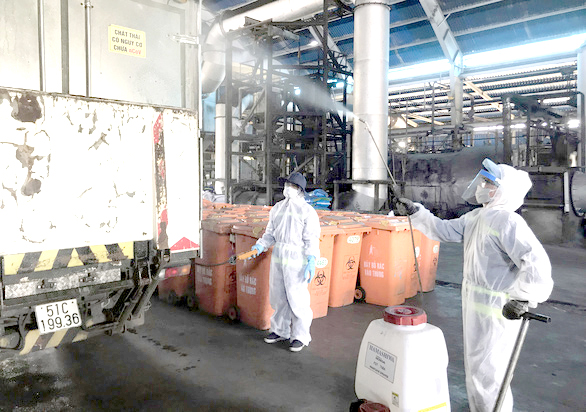 Society
Society

Garbage generated by COVID-19 quarantine areas is becoming a great concern as HCM City is near its maximum treatment capacity.

|
| A worker sprays disinfectant on a truck carrying COVID-19-related waste in HCM CITY. Photo: tuoitre.vn |
HCM CITY— Garbage generated by COVID-19 quarantine areas is becoming a great concern as HCM City is near its maximum treatment capacity.
Huỳnh Minh Nhựt, director of the HCM City Urban Environment Company Limited (CITENCO), which oversees the collection and treatment of all medical waste in hospitals and centralised quarantine zones, said that daily output has increased from 23 tonnes to 35 tonnes per day, while the capacity to treat medical waste is 42 tonnes per day.
If the amount of coronavirus-related waste continues to surge, it will overload the treatment plant, leading to a backlog which could endanger the environment.
According to Nhựt, the process of collecting and treating medical waste and waste from isolation areas is carried out according to strict safety standards. Garbage collection workers are equipped with protective gear.
Associate Professor Dr. Phùng Chí Sỹ, director of the Environmental Technology Centre (ENTEC), told Thanh Niên (Young People) newspaper that domestic waste from quarantine centres and lockdown areas is classified as hazardous waste and requires strict treatment procedures.
Medical waste is taken to Đông Thạnh waste treatment zone in Hóc Môn District where it undergoes disinfection processes, both chemically and thermally. After the trash is burned, the ash is solidified and buried in a location reserved for hazardous waste.
Other waste, such as face masks and protective clothing, is treated separately according to regulations, while the rest can be sent to landfills to be treated by burying and destroying, similar to the handling of waste generated during livestock and poultry epidemics.
CITENCO has proposed that the city create guidelines for the handling of COVID-19-related waste to avoid the risk of spreading disease in the community through garbage.
CITENCO has arranged 300 workers divided into three shifts a day to collect garbage in isolation areas under strict regulations.
CITENCO has plans to have their workers vaccinated at some point in the future.
Currently, the city has two concentrated COVID-19 quarantine centres run by the military, five centres at the city level, 23 at the district level, and 42 hotels with paid quarantine services, offering a total of 10,481 beds, according to the municipal health department.
The company suggested that local authorities encourage people in quarantine centres and lockdown areas to separate medical waste from domestic waste in order to reduce the amount of hazardous waste sent to incineration plants. VNS




